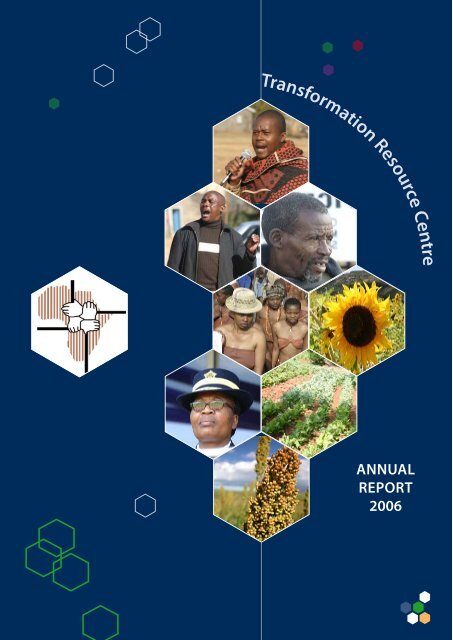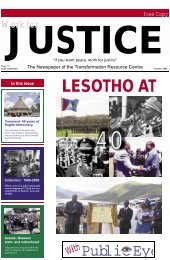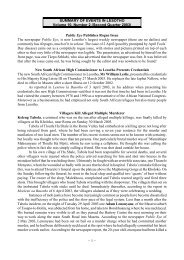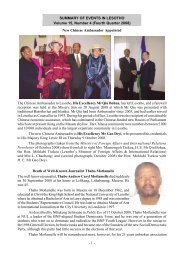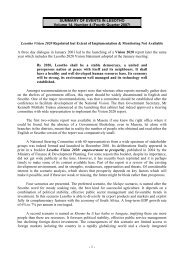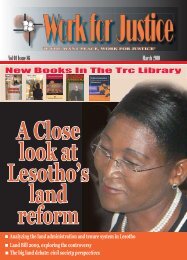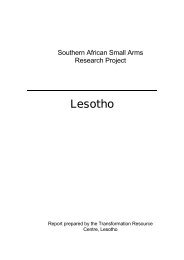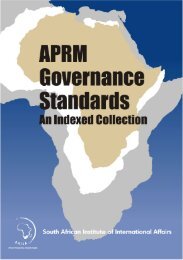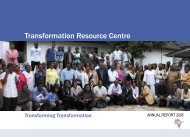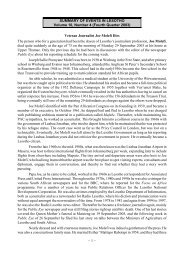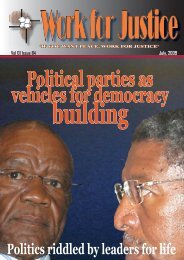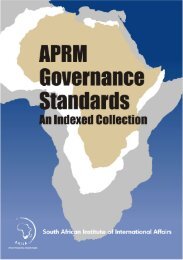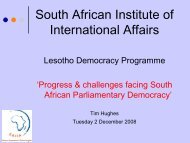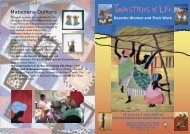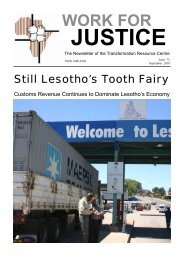2006 - the Transformation Resource Centre
2006 - the Transformation Resource Centre
2006 - the Transformation Resource Centre
You also want an ePaper? Increase the reach of your titles
YUMPU automatically turns print PDFs into web optimized ePapers that Google loves.
<strong>Transformation</strong> <strong>Resource</strong> <strong>Centre</strong><br />
Annual<br />
Report<br />
<strong>2006</strong>
Contents<br />
Message from <strong>the</strong> Chair 3<br />
Director’s statement 4<br />
Democracy and Human 5<br />
Rights<br />
Public Participation 5<br />
Local Government 6<br />
Exchange Programme 6<br />
Conflict Management and<br />
Prevention in Schools 7<br />
National Election 7<br />
Water for justice 8<br />
Social and Environmental<br />
Impact Assessments 8<br />
Livelihoods Activities 8<br />
Survivors of Lesotho Dams 8<br />
Ombudsman Enquiry 9<br />
On <strong>the</strong> Wrong Side of Development 9<br />
Library 10<br />
Procurement of Books and Journals 10<br />
Membership 10<br />
Library Users’ Review Session 10<br />
Internet Facilities 10<br />
Information and Communication<br />
Work for Justice and Litaba tsa Lesotho 11<br />
Anthology 11<br />
Summary of Events in Lesotho 11<br />
Reading Competition 11<br />
Small Arms 11<br />
Radio Programme 12<br />
Police Symposium 12<br />
Financial Statements 13<br />
Auditor’s Statement 13<br />
Revenue fund 14<br />
Balance sheet 15<br />
Annual Report <strong>2006</strong>
Nchafatso Sello<br />
Chairperson<br />
<strong>2006</strong> was marked by many events which<br />
contributed both positively and negatively<br />
in <strong>the</strong> promotion of democracy and human<br />
rights in <strong>the</strong> country. This is <strong>the</strong> main focus<br />
of <strong>the</strong> <strong>Transformation</strong> <strong>Resource</strong> <strong>Centre</strong> (TRC).<br />
For many years Basotho seemed<br />
reluctant to voice <strong>the</strong>ir concerns regarding<br />
maladministration and acts of corruption<br />
in <strong>the</strong> public service. But, <strong>2006</strong> became a<br />
year of change in which <strong>the</strong> public’s resolve<br />
against unpopular government practices<br />
and policies was unabated. This gave an<br />
impression that <strong>the</strong> public is fast becoming<br />
conscious of its democratic rights and<br />
is able to hold government accountable.<br />
A living example was <strong>the</strong> criticism of <strong>the</strong><br />
car scheme in which statutory position holders<br />
benefited. The issue caused heated debate and<br />
anger among <strong>the</strong> public. This took government<br />
by surprise as was reflected in its poor<br />
public relations strategy to handle <strong>the</strong> issue.<br />
Moreover, <strong>the</strong> nation was shocked by<br />
high profile assassinations and attempts<br />
on prominent people’s lives. These included<br />
<strong>the</strong> slaying of prominent politician, Bereng<br />
Sekhonyana, <strong>the</strong> Clinton Foundation volunteer,<br />
to mention but a few. To date, <strong>the</strong>se heinous<br />
crimes have not been solved. The questions<br />
that kept on bugging <strong>the</strong> nation were: why<br />
are <strong>the</strong>y happening? Are <strong>the</strong>y politically<br />
motivated? Why have <strong>the</strong> police not made<br />
breakthroughs in <strong>the</strong> investigations? Is<br />
proliferation of small arms <strong>the</strong> cause?<br />
Through its different programmes and projects,<br />
<strong>the</strong> TRC contributed immensely in raising<br />
public awareness to actively participate in<br />
decision making and government through<br />
different avenues. In our efforts to aid in<br />
<strong>the</strong> general response to crime, <strong>the</strong> TRC has<br />
embarked on a project to raise awareness<br />
Annual Report <strong>2006</strong><br />
about <strong>the</strong> dangers of illegal firearms. The<br />
project intends to set up more than 90 gunfree<br />
zones in <strong>the</strong> country by <strong>the</strong> end of 2007.<br />
Fur<strong>the</strong>rmore, <strong>the</strong> calling of snap elections<br />
created confusion and debate among <strong>the</strong><br />
politicians and <strong>the</strong> voting public. The main<br />
concern was whe<strong>the</strong>r <strong>the</strong> Independent<br />
Electoral Commission (IEC) would be able to<br />
prepare for a successful election in <strong>the</strong> short<br />
space of time. Many fears were on whe<strong>the</strong>r<br />
specific logistical issues pertaining to elections<br />
would be worked out given <strong>the</strong> limited time.<br />
Many also believed that <strong>the</strong> establishment<br />
of a new political party, <strong>the</strong> All Basotho<br />
Convention (ABC) by <strong>the</strong> former Minister of<br />
Communications caused panic in <strong>the</strong> ruling<br />
party, forcing <strong>the</strong> prime minister to call for early<br />
elections to seek a new mandate and possibly<br />
to catch <strong>the</strong> opposition off-guard. Most<br />
people, especially those in <strong>the</strong> urban areas,<br />
particularly <strong>the</strong> youth, had lost interest in<br />
elections. The ABC was like an agent of change<br />
which <strong>the</strong> urban voters had been waiting for.<br />
We still have to witness if such change in <strong>the</strong><br />
political sphere of this country would bring<br />
<strong>the</strong> necessary development that we all want.<br />
Basotho women, especially those who<br />
are married, had been treated like minors.<br />
They were in no position at all to make any<br />
major decisions without <strong>the</strong> authority of<br />
<strong>the</strong>ir husbands. A married woman would<br />
not even buy land or apply for a loan without<br />
<strong>the</strong> written consent from her husband.<br />
Such kind of a law was preventing women<br />
to engage in activities which could assist<br />
<strong>the</strong>m to improve <strong>the</strong>ir economic situation.<br />
It was also a clear violation of <strong>the</strong>ir human<br />
rights and that was also unconstitutional, as<br />
<strong>the</strong> constitution clearly stipulates that no one<br />
should be discriminated as a result of his or her<br />
gender. However, <strong>the</strong> approval of Legal Capacity<br />
of Married Persons Act <strong>2006</strong>, which intends<br />
to remove all forms of discrimination against<br />
married women, has been long overdue. This is<br />
a major achievement in <strong>the</strong> country but <strong>the</strong>re<br />
is still a long way to go and one still wonders<br />
whe<strong>the</strong>r <strong>the</strong> married women are now aware that<br />
<strong>the</strong>y have <strong>the</strong> same rights as <strong>the</strong>ir husbands.<br />
These and many o<strong>the</strong>r challenges have<br />
prompted <strong>the</strong> TRC to take a serious look at<br />
its programming and advocacy methods. We<br />
are currently looking to grow <strong>the</strong> organisation<br />
to be able to respond streng<strong>the</strong>n existing<br />
programmes and add new ones. Our strategy<br />
also needs beefing up with more creative<br />
approaches to make our work more effective.<br />
We invite you to join us in this endeavour.<br />
Chair’s Message
Director’s Statement<br />
Director<br />
Matšeliso Ntsoelikane<br />
Annual Report <strong>2006</strong><br />
In <strong>2006</strong>, <strong>Transformation</strong> <strong>Resource</strong><br />
<strong>Centre</strong> (TRC) faced a lot of challenges<br />
yet it was able to grow and increase its<br />
budget and staff members. The Church<br />
Development Service in Germany (EED)<br />
continued to be <strong>the</strong> main donor for<br />
<strong>the</strong> organization, providing <strong>the</strong> much<br />
needed financial resources for all <strong>the</strong><br />
programmes. However, in <strong>2006</strong> <strong>the</strong>y<br />
decided that <strong>the</strong>y would not longer<br />
provide funding for <strong>the</strong> Water for Justice<br />
programme. Christian Aid, which had<br />
also been supporting <strong>the</strong> TRC finally<br />
pulled out and <strong>the</strong>ir reason being that<br />
<strong>the</strong>ir organization no longer wanted to<br />
work in Sou<strong>the</strong>rn Africa as <strong>the</strong>y had a<br />
feeling that in o<strong>the</strong>r regions in Africa<br />
<strong>the</strong>re is a lot of work to be done than in<br />
sou<strong>the</strong>rn Africa. The news was very sad<br />
indeed. How would TRC cope with only<br />
one major donor? Would that mean<br />
<strong>the</strong> end of Water for Justice which<br />
has contributed a lot in addressing<br />
<strong>the</strong> needs of <strong>the</strong> communities which<br />
have been socially and economically<br />
negatively affected by <strong>the</strong> Lesotho<br />
Highlands Water Project (LHWP)?<br />
People know TRC as a result of <strong>the</strong><br />
important role it has been playing in<br />
fighting for <strong>the</strong> socio-economic rights<br />
of <strong>the</strong> LHWP affected communities.<br />
Many intensive efforts were made<br />
to make sure that <strong>the</strong> TRC could still<br />
have sufficient financial resources<br />
to run all its programmes effectively<br />
and efficiently. Under <strong>the</strong> Democracy<br />
and Human Rights Programme <strong>the</strong><br />
Open Society Initiative in Sou<strong>the</strong>rn<br />
Africa (OSISA), funded a 2 year project<br />
which is aimed at enhancing service<br />
delivery capacity of local authorities<br />
at Thaba Bosiu and Matsieng wards<br />
in <strong>the</strong> Maseru district. In collaboration<br />
with <strong>the</strong> Catholic Relief Service (CRS)<br />
and Catholic Commission for Justice<br />
and Peace (CCJP) through <strong>the</strong> financial<br />
support of Irish Aid, TRC embarked<br />
on a one year project which focused<br />
on raising awareness regarding<br />
gender issues so that women in <strong>the</strong><br />
country would be in a position to<br />
enjoy an environment where <strong>the</strong>ir<br />
rights are recognized and protected<br />
at <strong>the</strong> national and local levels. The<br />
programme also managed to secure<br />
funding from <strong>the</strong> Danish Embassy<br />
through <strong>the</strong> Sou<strong>the</strong>rn African Institute<br />
of International Affairs (SAIIA) in<br />
collaboration with <strong>the</strong> Institute of<br />
Democracy in Sou<strong>the</strong>rn Africa (IDASA)<br />
which will start in 2007 – 2009. The<br />
main objectives of this partnership<br />
are to empower parliament to fulfil<br />
its constitutional mandate, to raise<br />
<strong>the</strong> visibility and image of parliament<br />
and to increase public participation<br />
in <strong>the</strong> parliamentary process. This<br />
was a result of intensive studies<br />
carried out by SAIIA throughout SADC<br />
countries to find out <strong>the</strong> best ways<br />
to enhance <strong>the</strong> work of parliament.<br />
IDASA and American Embassy<br />
continued to support <strong>the</strong> Democracy<br />
and Human Rights Programme though<br />
small grants which were intended to<br />
promote public participation in politics.<br />
The Water for Justice Programme<br />
received <strong>the</strong> much needed funds to<br />
avoid its closure as a result of lack<br />
of funding. The Australian AID funded<br />
<strong>the</strong> programme to continue its work<br />
particularly on improving <strong>the</strong> livelihood<br />
of LHWP affected communities. The<br />
Green Grants though <strong>the</strong> International<br />
Rivers Network, <strong>the</strong> Canadian Church<br />
Service and OSISA supported <strong>the</strong><br />
programme in its advocating work of<br />
fighting <strong>the</strong> socio-economic rights of<br />
<strong>the</strong> LHWP affected communities. The<br />
grants were used solely for <strong>the</strong> purpose<br />
of participating in <strong>the</strong> public hearings<br />
conducted by <strong>the</strong> Ombudsman, to<br />
follow up on outstanding issues for<br />
communities affected by <strong>the</strong> LHWP and<br />
educating communities in Lesotho about<br />
<strong>the</strong> proposed Lesotho Water Policy.<br />
The Information and Communication<br />
Programme, among many of its major<br />
achievements for <strong>2006</strong> organised an<br />
International Symposium on Police<br />
Labour Relations in collaboration<br />
with Police and Prisons Civil<br />
Rights Union (POPCRU) and <strong>the</strong><br />
Lesotho Mounted Police Service<br />
Staff Association (LMPSSA). The<br />
symposium attracted a number of<br />
participants from various countries<br />
such as America, Ne<strong>the</strong>rlands and <strong>the</strong><br />
whole of <strong>the</strong> sou<strong>the</strong>rn Africa region.<br />
Dealing with issues of democracy and<br />
human rights poses a lot of challenges<br />
as it takes time to see an impact and<br />
results are not easily measurable.<br />
However, <strong>the</strong> <strong>Transformation</strong> <strong>Resource</strong><br />
<strong>Centre</strong> is still committed to grow<br />
as an organisation of governance,<br />
bring parliament closer to <strong>the</strong> people<br />
and to be a referral centre for good<br />
governance and human rights issues.
Programmes Achievements<br />
Democracy and Human Rights<br />
Councillors and chiefs at a conflict management<br />
workshop in Thaba Bosiu.<br />
Villagers enjoy reading Work For Justice in one of<br />
<strong>the</strong> public ga<strong>the</strong>rings by TRC<br />
Annual Report <strong>2006</strong><br />
Enhancing Public<br />
Participation in<br />
Governance Issues<br />
Basotho people do not fully<br />
participate in issues which affect<br />
<strong>the</strong>ir daily lives. They do not<br />
exercise <strong>the</strong>ir rights as <strong>the</strong>y have<br />
a major role which <strong>the</strong>y can play in<br />
influencing politicians when <strong>the</strong>y<br />
make decisions. Elected members<br />
of parliament are not accountable<br />
to those who have put <strong>the</strong>m in<br />
power as <strong>the</strong>y do not at all report<br />
back to <strong>the</strong>ir constituencies. With<br />
<strong>the</strong> assistance of <strong>the</strong> Institute<br />
of Democracy in Sou<strong>the</strong>rn Africa<br />
(IDASA), <strong>the</strong> TRC intensified its<br />
efforts to raise public awareness<br />
in relation to <strong>the</strong> important role<br />
<strong>the</strong>y cam play when participating<br />
in governance issues. The focus<br />
was on how to engage citizens<br />
with policy bodies, how to monitor<br />
policy implementation in order to<br />
enable effective service delivery,<br />
how to make inputs into <strong>the</strong> laws<br />
which come before parliament<br />
and also how to analyse <strong>the</strong><br />
national budget to ensure that<br />
<strong>the</strong> objectives of <strong>the</strong> Millennium<br />
Development Goals and <strong>the</strong> Poverty<br />
Strategy Policy are achieved.<br />
Fur<strong>the</strong>rmore, public awareness<br />
was raised in <strong>the</strong> form of public<br />
ga<strong>the</strong>rings which were held in<br />
various villages within <strong>the</strong> districts<br />
of Maseru, Berea, Thaba-Tseka,<br />
Mokhotlong and Qacha’s Nek.<br />
As a way of bringing parliament<br />
closer to <strong>the</strong> people and instilling<br />
democratic principles to <strong>the</strong><br />
Basotho people <strong>the</strong> organisation<br />
made it possible for high school<br />
students to visit <strong>the</strong> parliament.<br />
This was also done to make young<br />
people to be interested in politics<br />
and to fully understand how<br />
parliament operates. About 15<br />
high schools had that opportunity<br />
of visiting <strong>the</strong> parliament.<br />
Teachers of <strong>the</strong> concerned schools<br />
appreciated <strong>the</strong> work done by TRC<br />
as it had made <strong>the</strong>ir work easier.<br />
In <strong>2006</strong>, as a way of<br />
enhancing public participation<br />
in parliamentary issues, <strong>the</strong><br />
government of Lesotho proposed<br />
<strong>the</strong> establishment of <strong>the</strong><br />
Parliamentary Reform Committee<br />
(PRC) which was aimed bringing<br />
parliament closer to <strong>the</strong> people.<br />
The TRC in partnership with IDASA<br />
organized civil society organizations<br />
to make <strong>the</strong>ir submissions on<br />
how parliament could effectively<br />
and efficiently implement its<br />
mandate. It was recommended<br />
that <strong>the</strong> current constituency<br />
offices be used as offices which<br />
every citizen regardless of his<br />
or her political party affiliation<br />
could make submissions which<br />
would in turn be forwarded to<br />
parliament. The district offices<br />
should be established and <strong>the</strong><br />
concerned officers need to focus<br />
on issues such as sensitization of<br />
<strong>the</strong> communities in relation <strong>the</strong><br />
proposed bills, <strong>the</strong> work of <strong>the</strong><br />
portfolio committees, petitions<br />
made to <strong>the</strong> parliament, how to<br />
critically analyse <strong>the</strong> national<br />
budget and institutionalized<br />
parliamentary days. However, it is<br />
still yet to be seen if <strong>the</strong> civil society<br />
submission would be considered<br />
as due to political environment<br />
which prevailed in <strong>2006</strong>, it<br />
was difficult to put pressure on<br />
<strong>the</strong> political authorities to act<br />
accordingly. However, in 2007<br />
<strong>the</strong> organisation is planning to<br />
continue advocating for such new<br />
developments as if implemented<br />
well <strong>the</strong>y could contribute a<br />
lot in developing our country.
Local Government<br />
Local government is only one year old yet <strong>the</strong>re<br />
has been a lot of expectations from <strong>the</strong> public<br />
in terms of quick and improved service delivery.<br />
Conflicts between <strong>the</strong> new local councillors<br />
and <strong>the</strong> chiefs intensified as <strong>the</strong> chiefs felt that<br />
<strong>the</strong>ir powers were being taken away by <strong>the</strong> local<br />
councillors. To prevent fur<strong>the</strong>r conflicts which<br />
could negatively affect <strong>the</strong> important role which<br />
both <strong>the</strong> chiefs and local councillors play in<br />
community development, <strong>the</strong> TRC worked hand<br />
in hand with o<strong>the</strong>r organizations such as <strong>Centre</strong><br />
for Conflict Resolution in South Africa, Lesotho<br />
Council of NGOs (LCN), <strong>the</strong> Development for<br />
Peace Education (DPE), <strong>the</strong> Rural Self-help<br />
Development Association (RSDA), <strong>the</strong> Ministry<br />
of Local Government, Women and Law in<br />
Sou<strong>the</strong>rn Africa (WLSA), <strong>the</strong> Lesotho Mounted<br />
Police Service (LMPS) and <strong>the</strong> Master of<br />
<strong>the</strong> High Court to address such problems.<br />
It was noted that in terms of service<br />
delivery <strong>the</strong>re was no improvement at all and<br />
this was due to financial constraints as <strong>the</strong><br />
central government had not yet decentralized<br />
financial resources. However, due to efforts<br />
made by <strong>the</strong> TRC, <strong>the</strong> Ministry of Local<br />
Government and o<strong>the</strong>r stakeholders <strong>the</strong>re<br />
seemed to be major progress in improving<br />
<strong>the</strong> capacity of <strong>the</strong> local councillors. The<br />
roles of <strong>the</strong> chiefs, local councillors and<br />
community members were clarified and in<br />
areas which were covered within <strong>the</strong> districts<br />
of Maseru and Quthing all <strong>the</strong> stakeholders<br />
are clear as to what is expected from <strong>the</strong>m.<br />
The Open Society in Sou<strong>the</strong>rn Africa (OSISA)<br />
funded <strong>the</strong> programmes through a project<br />
which focused on enhancing service delivery<br />
of local councillors within Thaba-Bosiu and<br />
Matsieng wards. The programme provided <strong>the</strong><br />
communities, chiefs and local councillors with<br />
intensive training in relation to <strong>the</strong>ir expected<br />
roles, functions and responsibilities in ensuring<br />
that <strong>the</strong> local government becomes a success.<br />
The concerned communities were assisted to<br />
form development committees for different<br />
development issues and came up with action<br />
plans which <strong>the</strong>y should implement as per <strong>the</strong>ir<br />
priorities. The committees were introduced to<br />
<strong>the</strong> relevant government ministries for more<br />
assistance in <strong>the</strong> implementation of <strong>the</strong>ir<br />
action plans. The project has been used as<br />
an advocacy tool to show <strong>the</strong> communities<br />
that with little assistance from <strong>the</strong> outsiders<br />
<strong>the</strong>y could still realize <strong>the</strong>ir dreams of<br />
developing <strong>the</strong>ir communities. Activities such<br />
as land reclamation, construction of small<br />
roads, and <strong>the</strong> protection of springs and<br />
establishment of home gardens do not need<br />
assistance from <strong>the</strong> central government.<br />
Exchange Programme<br />
Through <strong>the</strong> assistance of <strong>the</strong> Norwegian Ministry<br />
of Foreign Affairs, <strong>the</strong> TRC received an<br />
employee from IDASA and sent one to IDASA<br />
as way of improving <strong>the</strong> capacity of <strong>the</strong> two<br />
organizations. The participants were expected<br />
to spend at least nine months with <strong>the</strong> host<br />
country to learn and contribute in <strong>the</strong> activities<br />
of <strong>the</strong> host organisation <strong>the</strong>reby sharing<br />
information, skills and knowledge. The Norwegian<br />
government also invited <strong>the</strong> representative<br />
of <strong>the</strong> organisation to attend a 1 week<br />
meeting in Norway whereby about more than<br />
300 participants from more than 20 countries<br />
through out <strong>the</strong> world discussed and<br />
shared ideas on how <strong>the</strong> participating organizations<br />
could fully benefit from <strong>the</strong> exchange<br />
programme. The meeting also gave TRC a<br />
good opportunity of networking with o<strong>the</strong>r<br />
NGOs which are dealing with <strong>the</strong> same issues.<br />
TRC led <strong>the</strong> community of Thaba Boisu on a public<br />
works campaign<br />
Ms. Tiisetso Madikhetla spent time with TRC on<br />
Norwegian Fredskorpset Exchange from Idasa<br />
Annual Report <strong>2006</strong>
Conflict Management and<br />
Prevention in schools<br />
The organization worked with a number of<br />
schools to manage and prevent conflicts which<br />
might affect negatively <strong>the</strong> education of learners.<br />
Leadership training were conducted for<br />
school prefect so that when <strong>the</strong>re are misunderstandings<br />
between <strong>the</strong> teachers and<br />
students, <strong>the</strong> representatives of <strong>the</strong> students<br />
could hold discussions with <strong>the</strong> management<br />
of <strong>the</strong> school to solve <strong>the</strong>ir problems without<br />
students going into strikes which normally<br />
have major consequences such as destruction<br />
of school property and suspension of classes<br />
and students. Where students were on strike,<br />
TRC manage to seat down with <strong>the</strong> school<br />
management and prefects to discuss solutions<br />
before it’s too late for students to be taught<br />
well and be prepared for <strong>the</strong>ir final examinations.<br />
With such interventions from TRC, <strong>the</strong><br />
number of strikes in schools has gone down<br />
Voters casting <strong>the</strong>ir dual vote for constituency and <strong>the</strong> party vote<br />
National Elections<br />
The Minister of Communications, Science and<br />
Technology resigned and formed a new party<br />
called All Basotho Convention (ABC). The formation<br />
of this party attracted a lot of attention<br />
and mostly to <strong>the</strong> youth who had long lost interest<br />
in politics. It was also a threat to <strong>the</strong> ruling<br />
party as some of its members crossed <strong>the</strong> floor<br />
in <strong>the</strong> parliament and joined this new party. As<br />
a result <strong>the</strong> King with <strong>the</strong> advise of <strong>the</strong> Prime<br />
Minister called a snap election. That put all <strong>the</strong><br />
stakeholders under a lot of pressure and <strong>the</strong><br />
TRC in collaboration with <strong>the</strong> Lesotho Council<br />
of NGOs had to immediately educate <strong>the</strong> voters<br />
and prepare teams to monitor <strong>the</strong> climate<br />
during <strong>the</strong> political campaigns, registration of<br />
voters by <strong>the</strong> IEC including <strong>the</strong> actual voting.<br />
The Ruling LCD still commands huge support<br />
Voters on polling day<br />
The new All Basotho Convention made an emphatic presence on<br />
<strong>the</strong> political stage<br />
Annual Report <strong>2006</strong>
Water For Justice<br />
Social and environmental<br />
impact assessments<br />
The programmme had a number of meetings with<br />
<strong>the</strong> stakeholders pertaining to <strong>the</strong> proposed<br />
water and environment projects such as <strong>the</strong><br />
Lesotho Lowlands Water Project (Metolong<br />
Dam), upgrading of <strong>the</strong> Maqalika reservoir,<br />
<strong>the</strong> establishment of a disposal area by <strong>the</strong><br />
Maseru City Council, The Thaba Bosiu Cultural<br />
Village and <strong>the</strong> Sehlaba Thebe National Park.<br />
In <strong>the</strong> meetings <strong>the</strong> programme emphasized<br />
on <strong>the</strong> importance of conducting social and<br />
environmental impact assessments before <strong>the</strong><br />
projects could start as a way of mitigating any<br />
negative social and environmental impact on<br />
<strong>the</strong> well being of <strong>the</strong> affected communities.<br />
Public mobilization and awareness<br />
raising were conducted at Metolong<br />
community regarding <strong>the</strong> anticipated social<br />
and environmental effects of <strong>the</strong> proposed<br />
Metolong Water Project. Through <strong>the</strong> pubic<br />
ga<strong>the</strong>rings <strong>the</strong> communities were mobilized<br />
to voice out <strong>the</strong>ir concerns and demand <strong>the</strong>ir<br />
rights during <strong>the</strong> pre-feasibility, environmental<br />
impact assessment and post construction<br />
phases. Both <strong>the</strong> communities and <strong>the</strong><br />
authorities were made aware of <strong>the</strong> importance<br />
of public participation in <strong>the</strong> project.<br />
Livelihoods Activities<br />
The programme in collaboration with<br />
Snowing Mountain Engineering Company<br />
(SMEC) which is a consultancy firm responsible<br />
for facilitating, managing and coordinating<br />
development projects within <strong>the</strong> communities<br />
affected by <strong>the</strong> LHWP conducted a series<br />
of public consultation at Ha Lejone, Katse,<br />
Muela and Mohale villages. The aim of <strong>the</strong><br />
public consultations was to facilitate <strong>the</strong><br />
identification of <strong>the</strong> development needs and<br />
priorities of <strong>the</strong> affected communities. Focus<br />
was on <strong>the</strong> establishment of small livelihoods<br />
projects so that <strong>the</strong> communities can be<br />
able to take care of <strong>the</strong>ir households needs.<br />
Financial assistance was sort from <strong>the</strong><br />
Australian Aid to help <strong>the</strong> programme to<br />
intensify its efforts on livelihoods projects within<br />
<strong>the</strong> communities who were resettled to make<br />
way for <strong>the</strong> construction of <strong>the</strong> Mohale dam.<br />
Australian Aid provided <strong>the</strong> programme with<br />
M210, 000.00 to help <strong>the</strong> affected communities<br />
to engage in organic farming which is affordable<br />
and sustainable as <strong>the</strong> communities mostly<br />
use locally available agricultural iputs. The<br />
project started towards <strong>the</strong> end of <strong>the</strong> year<br />
and in 2007 its impact in terms of bringing<br />
<strong>the</strong> intended positive change on <strong>the</strong> lives of<br />
<strong>the</strong> concerned communities would be seen.<br />
However <strong>the</strong> 54 households from Ha Makotoko<br />
and Nazereth villages were assisted with<br />
garden tools (Digging forks, spades, rags and<br />
watering cans) and vegetable seeds (tomatoes,<br />
green beans, carrots, beetroot, spinach,<br />
radish, butternut and onion) to start vegetable<br />
gardens within <strong>the</strong>ir households. The same<br />
households were also provided with intensive<br />
and practical training on organic farming with<br />
<strong>the</strong> assistance from an organization called<br />
<strong>the</strong> Rural Self Help Development Association.<br />
Survivors of Lesotho Dams<br />
The programme continued to assist a community<br />
based organization called Survivors of Lesotho<br />
Dams (SoLD) to fur<strong>the</strong>r pursue <strong>the</strong> Lesotho<br />
Highlands Water Authority (LHWA) to address<br />
<strong>the</strong> needs of <strong>the</strong> affected communities. A three<br />
day workshop was conducted to provide <strong>the</strong><br />
members with leadership skills so that <strong>the</strong>y<br />
could be able to lead <strong>the</strong> affected communities<br />
in terms of collecting <strong>the</strong>ir complaints and<br />
bring <strong>the</strong>m forward to <strong>the</strong> LHDA authorities.<br />
Despite <strong>the</strong> drought vegetables were grown to support<br />
livelihoods<br />
Families can now rely on home-grown vegetables to<br />
sustain <strong>the</strong>mselves<br />
Annual Report <strong>2006</strong>
Following <strong>the</strong> intervention of SOLD with <strong>the</strong><br />
assistance of <strong>the</strong> Programme Officers <strong>the</strong><br />
Thetsane resettled community each received<br />
an individual compensation of M7, 617.17 for<br />
poor construction of <strong>the</strong>ir houses. It was quite<br />
an achievement as <strong>the</strong> communities had been<br />
crying to <strong>the</strong> LHWA to address such complaints<br />
and with that money <strong>the</strong> households were<br />
able to rectify such defects from <strong>the</strong>ir houses.<br />
The houses which were without burglar proof<br />
bars were fitted and also those who had<br />
problems with <strong>the</strong> geysers were repaired.<br />
Ombudsman Report and<br />
public hearings<br />
The Ombudsman produced a big report<br />
concerning <strong>the</strong> complaints form <strong>the</strong> affected<br />
communities as a result of <strong>the</strong> construction of<br />
<strong>the</strong> Mohale dam. The Ombudsman discovered<br />
that <strong>the</strong> LHWA delayed to implement most of<br />
<strong>the</strong> recommendations made by <strong>the</strong> Lesotho<br />
Highlands Water Commission (LHWC) in<br />
relation to delay of compensation payment to<br />
<strong>the</strong> affected communities. The Ombudsman<br />
made a recommendation that if communities<br />
are receiving <strong>the</strong>ir compensation late, when<br />
LHDA finally pay <strong>the</strong>m <strong>the</strong>y should include<br />
<strong>the</strong> interest as per <strong>the</strong> commercial lending<br />
rate. As a result of <strong>the</strong> pressure from SOLD,<br />
TRC and Ombudsman LHDA decided to form<br />
a commission of enquiry and audit team to<br />
provide it with findings and recommendations<br />
regarding <strong>the</strong> management and administration<br />
of <strong>the</strong> compensation scheme. The Ombudsman<br />
in collaboration with TRC also a series of<br />
public hearings regarding <strong>the</strong> complaints<br />
from <strong>the</strong> affected communities in Katse<br />
community. Among <strong>the</strong> major complaints<br />
from <strong>the</strong> communities was <strong>the</strong> fact that<br />
communities quality of live has worsened as<br />
a result of <strong>the</strong> construction of <strong>the</strong> Katse dam.<br />
The Ombudsman is yet to produce a report<br />
regarding <strong>the</strong> hearings and TRC is planning to<br />
take legal action regarding major complaints as<br />
<strong>the</strong> Ombudsman has no legal authority to force<br />
LHDA to implement his/her recommendations.<br />
On <strong>the</strong> Wrong Side of<br />
Development<br />
With an assistance from Green Grants<br />
and International Rivers Network, TRC<br />
produced a book called “On <strong>the</strong> Wrong Side of<br />
Development; Lessons Learnt from <strong>the</strong> Lesotho<br />
Highlands Water Project”. The book focuses<br />
on <strong>the</strong> economic and social negative impact<br />
of <strong>the</strong> LHWP on <strong>the</strong> affected communities. It<br />
addresses <strong>the</strong> problems of <strong>the</strong> LHWP as seen<br />
through <strong>the</strong> eyes of <strong>the</strong> communities which are<br />
directly affected. TRC organized a big launch of<br />
<strong>the</strong> book. All <strong>the</strong> stakeholders were invited and<br />
LHWP affected communities gave <strong>the</strong>ir touching<br />
life experiences of <strong>the</strong> failures of <strong>the</strong> LHWP to<br />
keep most of <strong>the</strong>ir promises. The leading local<br />
newspaper Public Eye published an article on<br />
front page regarding <strong>the</strong> launch of <strong>the</strong> book..<br />
The Ombudsman, Sekara Mafisa, listened critically<br />
to <strong>the</strong> grievances of <strong>the</strong> resettled communities<br />
Communities receive feedback on environmental<br />
issues at public hearings<br />
Field worker Mothusi Seqhee speaking at a public<br />
hearing<br />
Annual Report <strong>2006</strong>
Library<br />
Procurement of Books and<br />
Journals<br />
The programme procured 19 periodicals and<br />
683 books on <strong>the</strong>ology, conflict, psychology,<br />
fiction, management, accounting, research,<br />
history, democracy, health, conflict, leadership,<br />
local government, education, economics and<br />
women and gender. The books increased<br />
<strong>the</strong> number of <strong>the</strong> library collection and<br />
<strong>the</strong>reby satisfying <strong>the</strong> requirements in terms<br />
of quality and quantity of books demanded<br />
by <strong>the</strong> library users. Reports and Journals<br />
on issues such as Trade Union World report<br />
and Development and Cooperation Report<br />
were donated by TRC friends and members.<br />
Membership<br />
168 members renewed <strong>the</strong>ir membership, 122<br />
people became new members of TRC Library, 8<br />
TRC members while 2 organisations joined as<br />
TRC members. This year TRC library recorded<br />
highest quarterly readers of an average of<br />
1,962. This has encouraged <strong>the</strong> organization<br />
a lot in terms of valuing <strong>the</strong> contribution it is<br />
making in <strong>the</strong> country in terms of improving<br />
<strong>the</strong> level of literacy, education and research in<br />
Lesotho which without <strong>the</strong> general development<br />
of <strong>the</strong> country would be negatively affected.<br />
Library User’s Review<br />
Session<br />
A review session was held for all <strong>the</strong> people who<br />
use <strong>the</strong> Library and <strong>the</strong>y were required to filled<br />
a questionnaire which was distributed to <strong>the</strong>m<br />
and <strong>the</strong> questionnaire focused on how to improve<br />
<strong>the</strong> library. As a result of recommendation<br />
made by <strong>the</strong> readers <strong>the</strong> following changes<br />
were made: <strong>the</strong> opening hours were increased,<br />
cooling and heating facilities were installed<br />
and right quality of books were purchased.<br />
Internet Facilities<br />
The programme purchased 4 computers and a<br />
printer as a way of improving its library services.<br />
The computers were procured to provide<br />
internet, typing and printing facilities to <strong>the</strong><br />
library users. This assisted <strong>the</strong> users with <strong>the</strong><br />
very much need facilities as <strong>the</strong>y are now able to<br />
find all <strong>the</strong> services in one place unlike before.<br />
This also contributed a lot in increasing <strong>the</strong><br />
number or people who visited <strong>the</strong> TRC library.<br />
10 Annual Report <strong>2006</strong>
Information and<br />
Communication<br />
Work For Justice and<br />
Litaba Tsa Lesotho<br />
The programme continued to produce<br />
newsletters quarterly both in English and<br />
Sesotho. The first issue focused on <strong>the</strong> police<br />
reforms which were intended at providing<br />
effective and efficient public police oversight<br />
mechanism. The information provided <strong>the</strong><br />
readers with <strong>the</strong> in depth work <strong>the</strong> police and<br />
why <strong>the</strong>re was a need for reforms to improve<br />
<strong>the</strong> police service and how far was <strong>the</strong> process<br />
of <strong>the</strong> reforms. What was more important to<br />
<strong>the</strong> Basotho people was information of what is<br />
<strong>the</strong> role of police in a democratic country is and<br />
how <strong>the</strong> citizens demand could services from<br />
<strong>the</strong> police could and where police abuse <strong>the</strong>ir<br />
powers how could <strong>the</strong>y deal with such incidences.<br />
The second issue discussed major economic,<br />
social and political events in Lesotho since<br />
independence as well as <strong>the</strong> country’s<br />
development achievements and challenges.<br />
The newsletter was an insert to <strong>the</strong> Public<br />
Eye newspaper. The newsletter attracted a lot<br />
of attention from o<strong>the</strong>r media organizations.<br />
News Africa and Republic of South Africa FM<br />
radio stations requested for interviews with<br />
TRC on <strong>the</strong> subject of Lesotho’s milestones in<br />
its 40th independence anniversary. The third<br />
issued examines <strong>the</strong> political parties in relation<br />
<strong>the</strong> coming national election early in 2007.<br />
Anthology<br />
The programme through <strong>the</strong> assistance of<br />
John Gay who is <strong>the</strong> former employee of TRC<br />
based in United States of America compiled<br />
an anthology of <strong>the</strong> past Work for Justice<br />
Newsletters which were published from<br />
1983 to 2004. 250 copies were produced<br />
and widely distributed to <strong>the</strong> organization’s<br />
partners, locally, regionally and internationally.<br />
Summary of Events in<br />
Lesotho<br />
Professor Ambrose from <strong>the</strong> National University<br />
of Lesotho (NUL) on a quarterly bases provided<br />
TRC with a short summary of <strong>the</strong> current events<br />
which happened in <strong>the</strong> country. The summary<br />
of events was posted on <strong>the</strong> TRC website and<br />
that attracted a lot of online visitors who were<br />
interested in knowing what was happening<br />
within <strong>the</strong> country.<br />
Reading competition<br />
The National Reading Competition for <strong>the</strong> high<br />
school students was held in collaboration with<br />
<strong>the</strong> Ministry of Education. The aim to <strong>the</strong> reading<br />
competition was to promote <strong>the</strong> reading culture<br />
in Lesotho particularly for young students. 18<br />
high schools participated in <strong>the</strong> competition.<br />
Students were given 2 passages to read from<br />
and were rated on how well <strong>the</strong>y read. The<br />
winners got books as prizes and <strong>the</strong> event<br />
received a wider media coverage auguring well<br />
with TRC’s library membership and literacy work.<br />
TRC friends<br />
11 Annual Report <strong>2006</strong>
Small Arms<br />
There is global concern about <strong>the</strong> wrong<br />
usage of small arms by some <strong>the</strong> community<br />
members to commit criminal offences. United<br />
Nations had developed a programme of action<br />
against small arms. In Lesotho <strong>the</strong>re had been<br />
a lot of incidences whereby prominent people<br />
had been killed or attacked. As a result of such<br />
incidences in line with UN programme, TRC<br />
organized a friends meeting in collaboration<br />
with <strong>the</strong> police to discuss <strong>the</strong> role of civil<br />
society in <strong>the</strong> prevention of <strong>the</strong> misuse of<br />
small arms. The meeting drew a lot of publicity<br />
for <strong>the</strong> organization as it was covered by a<br />
number of local newspapers and it made <strong>the</strong><br />
front page on one local newspaper. TRC also<br />
produced an article on <strong>the</strong> political attacks in<br />
<strong>the</strong> country and was published in a leading<br />
newspaper and that promoted a lot of debate.<br />
International Symposium<br />
on Police Labour Relations<br />
TRC organized and hosted <strong>the</strong> international<br />
symposium on police labour relations in<br />
collaboration police union and police association<br />
in South Africa and Lesotho respectfully.<br />
The symposium attracted more than 180<br />
participants form overseas and regionally.<br />
TRC through <strong>the</strong> symposium managed to<br />
raise its profile, as it received international<br />
exposure and recognition for hosting such<br />
big events and received financial boost.<br />
TRC was represented during <strong>the</strong><br />
preparatory meeting of <strong>the</strong> United Nations<br />
Programme of Action on Small Arms<br />
organized by <strong>the</strong> International Action Network<br />
on Small Arms (IANSA). After <strong>the</strong> meeting<br />
<strong>the</strong> programme made press releases and<br />
distributed <strong>the</strong>m to all <strong>the</strong> media houses<br />
within <strong>the</strong> country. The press release focused<br />
on <strong>the</strong> successes and challenges facing<br />
<strong>the</strong> implementation of <strong>the</strong> programme.<br />
Radio Programme<br />
In partnership with Catholic Radio station<br />
TRC had a slot every Monday to discuss currents<br />
events happening in <strong>the</strong> country and mostly to<br />
deepen understanding of <strong>the</strong> Basotho people<br />
regarding democracy issues. Panelists were<br />
normally invited during <strong>the</strong> radio programme to<br />
streng<strong>the</strong>n <strong>the</strong> level of debates by <strong>the</strong> public.<br />
Members of <strong>the</strong> Lesotho Mounted Police Staff Association during <strong>the</strong><br />
International Symposium on Police Labour Relations<br />
12 Annual Report <strong>2006</strong>
Financial Statements <strong>2006</strong><br />
Report of <strong>the</strong> Independent Auditors to <strong>the</strong> Members of:<br />
TRANSFORMATION RESOURCE CENTRE<br />
We have audited <strong>the</strong> financial statements for <strong>the</strong> year ended 31 December <strong>2006</strong> of which <strong>the</strong> income statement and balance<br />
sheet included in this report are an extract and signed copies can be obtained from <strong>Transformation</strong> <strong>Resource</strong> <strong>Centre</strong><br />
in Maseru.<br />
Basis of Opinion:<br />
We conducted our audit in accordance with International Auditing Guidelines. These guidelines require that we plan and<br />
perform <strong>the</strong> audit to obtain reasonable assurance that, in all material respects, fair presentation is achieved in <strong>the</strong> financial<br />
statements. An audit<br />
Includes an evaluation of <strong>the</strong> appropriateness of <strong>the</strong> accounting policies; an examination, on a test basis, of evidence<br />
supporting <strong>the</strong> amounts and disclosures included in <strong>the</strong> financial statements; an assessment of <strong>the</strong> reasonableness of significant<br />
estimates, and a consideration of <strong>the</strong> appropriateness of <strong>the</strong> overall financial statement presentation. We consider<br />
that our audit procedures were appropriate in <strong>the</strong> circumstances to express our opinion stated below.<br />
Opinion:<br />
In our opinion, <strong>the</strong> financial statements fairly present <strong>the</strong> financial position of <strong>the</strong> <strong>Centre</strong> as at 31 December <strong>2006</strong> and <strong>the</strong><br />
movement in its revenue fund for <strong>the</strong> year ended on that date.<br />
Moores Rowland<br />
Chartered Accountants (Lesotho)<br />
13 Annual Report <strong>2006</strong>
Revenue Fund<br />
For <strong>the</strong> year ended 31 December <strong>2006</strong><br />
<strong>2006</strong> 2005<br />
M<br />
M<br />
Revenue<br />
Funding (Note 1) 3 215 337 1 560 579<br />
Interest Receivable 12 643 8 244<br />
Membership fees 13 775 12 648<br />
Miscellaneous income 29 202 46 368<br />
Rental and use of facilities 45 350 72 739<br />
Sales 9 508 9 304<br />
Total Revenue 3 325 815 1 709 882<br />
Expenditure<br />
Democracy and Human Rights 528 591 449 993<br />
Water for Justice 487 366 421 121<br />
Library <strong>Resource</strong> <strong>Centre</strong> 356 258 198 849<br />
Information and communication 579 742 258 909<br />
Organisational and Capacity Development 80 653 189 549<br />
Central Administration and Co-ordination 805 369 728 100<br />
O<strong>the</strong>r Costs 91 459 96 519<br />
Acquiring & Developing Programme and Admin <strong>Centre</strong><br />
Transfer of Property Costs 76 802 -<br />
Total - per project financial reports 3 006 240 2 343 040<br />
Less capital costs reflected as fixed assets (201 654) 120 404)<br />
Adjustment for non-cash items: - Depreciation 221 679 234 418<br />
- O<strong>the</strong>r 36 273 -2<br />
Total Expenditure 3 062 538 2 457 052<br />
Net Movement for <strong>the</strong> year 263 277 (747 170)<br />
Balance of Fund at <strong>the</strong> beginning of <strong>the</strong> year 1 018 978 1 766 148<br />
Balance of Fund at <strong>the</strong> end of <strong>the</strong> year 1 282 255 1 018 978<br />
14 Annual Report <strong>2006</strong>
Balance Sheet as at 31 December <strong>2006</strong><br />
<strong>2006</strong> 2005<br />
M<br />
M<br />
EMPLOYMENT OF CAPITAL<br />
FIXED ASSETS 3 939 656 3 894 493<br />
Current assets<br />
Debtors and prepayments 3 560 18 892<br />
Funds at call and on deposit 720 608 390 075<br />
Bank balances and cash 209 445 136 277<br />
Total Current assets 933 613 545 244<br />
CURRENT LIABILITIES<br />
Creditors and accruals 208 571 148 782<br />
Total current liabilities 208 571 148 782<br />
NET CURRENT ASSETS 725 042 396 462<br />
Total employment of capital 4 664 698 4 290 955<br />
CAPITAL EMPLOYED<br />
Capital Contributions 3 382 443 3 271 977<br />
Revenue Fund 1 282 255 1 018 978<br />
Total Capital employed 4 664 698 4 290 955<br />
Note 1 FUNDING<br />
<strong>2006</strong> 2005<br />
Evangelischer Entwicklungsdienst e.V 1 039 375 949 085<br />
Australian High Commission 209 750 -<br />
Christian Aid 322 615 458 255<br />
Green Grant 16 844 87 715<br />
IDASA 277 866 35 194<br />
International Rivers Network 54 929 -<br />
Miscellaneous 19 075 30 330<br />
Open Society 668 973 -<br />
POPCRU 546 500 -<br />
United Church of Canada 59 410 -<br />
Total Funding 3 215 337 1 560 579<br />
15 Annual Report <strong>2006</strong>
TRC<br />
1 Oak Tree Gardens<br />
Qoaling Road<br />
Old Europa, Maseru 100<br />
Tel: +266 22314463<br />
www.trc.org.ls


